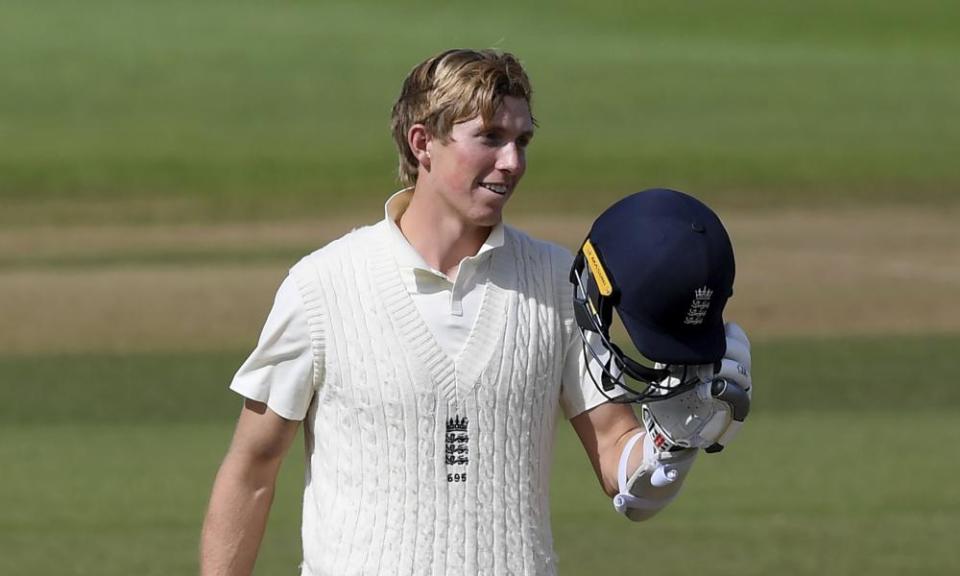Zak Crawley's huge double-century lifts England and floors Pakistan

The England cricket team under Joe Root has rarely been renowned for its ruthlessness. They have often been highly entertaining; they have conjured some stunning victories; there have been crazy collapses and one fancy declaration. But on Saturday they clinically ground Pakistan down, allowing them no way back into the game. They amassed a mammoth total of 583 for eight, whereupon Jimmy Anderson took three Pakistan wickets at the end of an extended final session.
Look at the figures: Zak Crawley hit a monumental 267; his partnership of 359 with Jos Buttler was the record for the fifth wicket for England; perhaps most startling of all Buttler, the swashbuckler supreme, did not hit a boundary throughout the entire afternoon session. Instead he sat happily on his bat handle, after reaching his second Test century two years and 24 matches after his first, and continued to admire the silky stroke play of Crawley. Both of them played the longest innings of their careers.
Related: Zak Crawley emerges from cricket's data fog to leave Pakistan reeling | Jonathan Liew
Crawley added another 96 runs to his overnight score; in that time Buttler scored 50, which highlights the nature of England’s progression. Once Crawley had become the third youngest English double centurion in history – after Sir Len Hutton and David Gower (no pressure there then) – he unveiled the memorable shots of the day: there were timeless, classical cover drives and impudent 21st-century reverse sweeps. But even Crawley, on 171 at the start, was prepared to graft throughout the early overs when there was rain in the air and some spring in the steps of the Pakistan bowlers, who beat the bat frequently enough to give hope of some wickets.
England were obviously set upon a mammoth score. Maybe having studied the forecast, which suggests the weather deteriorates on Tuesday, England reckoned they would have to enforce the follow-on to win. The plan was to bat once in the match, so that even when their total was beyond 500 there was still an unusual caginess to their batting.

So for much of the day the cricket lacked the tension that has been prevalent throughout most of the summer, although there were a few hearts beating more quickly when Buttler was given out caught behind against Mohammad Abbas on 99. An immediate review, however, demonstrated that Buttler’s bat had hit his pad and not the ball. The next delivery was punched away on the off side and he could celebrate a long-awaited century. Argue about who keeps wicket if you like, but Buttler has to be in the team now, especially against spin-orientated sides in the sub-continent.
So does Crawley after this match. Batsmen new to Test cricket are usually most perplexed by the paucity of poor deliveries, which makes run-scoring at their normal rate a major challenge. But this has not applied to Crawley this summer. He is a natural aggressor and he does not seem bothered what sort of game he is playing. This could be attributed to the glorious naivety of the newcomer but it seems more likely that he possesses a simple, clear-headed approach allied to the maturity to recognise that he should just trust his game. He bats with a smile, something which was especially evident when surpassing the double century scored by his friend and mentor, Rob Key. The anticipation now is that Crawley will surpass Key’s 15 Tests for England.
Related: 'A great kid to bat with': Jos Buttler praises Zak Crawley after huge stand
So the partnership flourished long into the afternoon; there were a few flourishes from Crawley and none at all from Buttler. The quartet of frontline bowlers never wilted yet their efforts were only rewarded when Shaheen Afridi bowled Stuart Broad, which prompted Joe Root to declare on 583 for eight. The other three wickets to fall were shared by the part-timers, which is often a source of frustration to the true foot soldiers.
Eventually Crawley ran down the wicket to the low-slung off-breaks of Asad Shafiq, who bowled mostly outside of leg stump, and he was stumped by the ever-alert Mohammad Rizwan. Unusually Buttler was unable to change gear and he ended up presenting Fawad Alam with a simple return catch. But he did have 152 at the time. Chris Woakes hit a neat 40 before driving to cover off Fawad, while Dom Bess and Broad swished merrily until the latter’s dismissal.
Related: England v Pakistan: third Test, day two – as it happened
Pakistan had 13 overs to negotiate and this was always going to be a trial after so long in the field, especially for Shan Masood. He scored a gritty, career-best 156 in the first Test but no one has tormented him like Anderson. Masood probably knew what was coming but he could not do much about it. In his second over Anderson found that devilish swing into the left-hander’s pads and Masood was lbw, despite a desperate, ill-advised review from the batsman. This was the eighth time that Anderson had dismissed Masood in Test cricket.
Now the force was with Anderson; the dark Dukes was swinging just enough. In his next over Abid Ali pushed forward tentatively and the edge was well held by Dominic Sibley at third slip. Then Babar Azam was trapped in front. Pakistan had been cornered – ruthlessly.

 Yahoo Sport
Yahoo Sport 





































